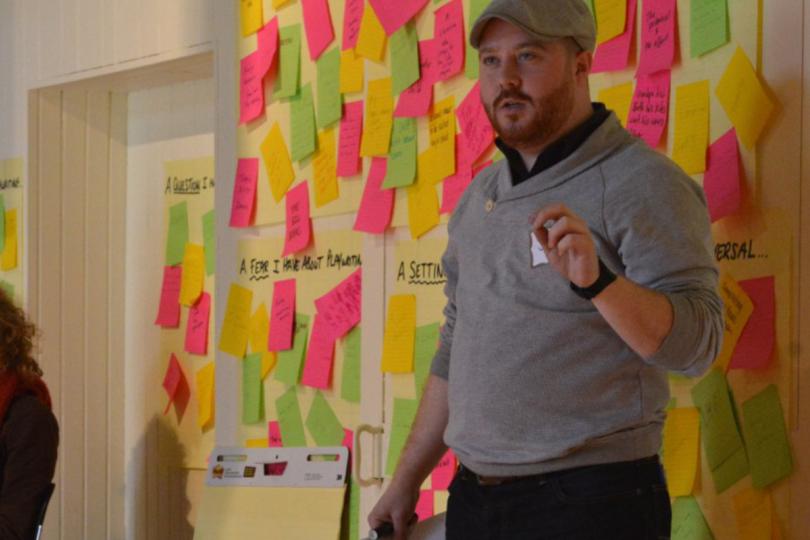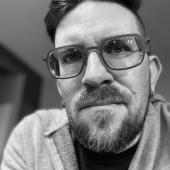Reclaiming the term "disruptor"

Editor’s Note: I had the chance to sit down with Jay Gilman the new Artistic Director of the Minnesota Fringe. We discussed the new position, adding curatorial elements to an organization like the Fringe, and of course food. We met at The Draft Horse in NE Minneapolis. This interview has been transcribed and edited from its original recording.
Tell me a bit about your background
I grew up in Kansas City, so I’m a Midwestern native. I went to undergrad at Goucher College in Baltimore, and grad school at Penn in Philly. My background is primarily making work at the intersection of new plays/performances and social impact, and I’ve worked in Baltimore, DC and Philly at some wonderful orgs including Baltimore Center Stage, Philadelphia Young Playwrights, and fringe-y upstarts including Orbiter 3 Playwrights Collective, Bearded Ladies Cabaret and others.
Ultimately, I’m really interested in helping artists solve problems, and find new methods and models both on stage and off in a performing arts industry that’s frankly grown pretty entrenched.
How did you get connected to the Artistic Director role at the Minnesota Fringe Festival?
I have no connections to Minnesota -- I’m a total newbie! But I’ve always heard great things about the Twin Cities arts community. Many folks here know this already, but the Twin Cities have a very strong national reputation -- Mixed Blood, Theatre Mu, the Guthrie, Playwrights Center, Springboard and of course, Fringe -- these were organizations I knew and admired well-before the idea of living here was ever on my radar. Dawn (Bentley - Minnesota Fringe Festival Executive Director) is also new to Fringe as of last year, and hiring me was one of her first items on the to-do list. I think it speaks highly to all of the previous and remaining staff at Fringe that our reputation is as strong as it is.
When was your official start?
Late May/June 2017 -- I was packing, moving and driving cross-country in late May, doing work remotely as able to get up to speed as the Festival loomed.
Tell me a little about this new Artistic Director role?
Fringe is firmly committed to a lottery-driven Festival as our core program. That’s not changing. But we think we have a network of artists ready for more, an audience eager to take risks, and staff expertise that can be useful to artists at more points in the calendar year, and in new contexts.
We’re in the midst of launching a brand new website, new programs, and a new message -- Minnesota Fringe means adventurous art year-round, not just for 2 weeks every summer.
So my role as A.D. is part of that transition. A few weeks ago we introduced our first new program, Fringe Presents, which is curated work that helps Festival artists hoist themselves to the next rung of the artistic ladder. We premiered a best of compilation of “Couple Fight” by Weggel-Reed Productions at BLB to two sold out houses during Valentine’s week, which was their first production as a producing company outside of the Festival, though Anna and Tom have of course done work elsewhere individually. Another new program is our inaugural jury-curated Minnesota Family Fringe. We just announced this year’s six productions featuring adventurous work for kids 12-and-under and their families.
We’re also going to be launching a new program called Drafts and Draughts (points to his cider and my beer) in April. At Surly Brewery, it will be works-in-progress scratch night -- artists showcasing unfinished, staged excerpts of work with informal feedback from audiences. Some will be works that will go on to premiere at the Festival, some will feature artists who have done work at the Festival in the past, but no longer do, and some will feature artists who have never been in the Festival but produce at other organizations in town. They’ll all be local, generative artists of a wide range of disciplines interested in moving their work forward developmentally.
Fringe has a long history of non-curated stuff, can you talk about curation and how you bring that to an organization that has long eschewed that process.
Sure -- we continue to be staunchly uncurated when it comes to the Festival. That model is really great as is. The Festival is such an important disruptive force in the Twin Cities, and we don’t want to change that.
But I think my community-based background and the fact that I’ve served artists at a lot of different ages and experiences in the past informs the kind of curation we’re interested in -- which is to say very much in dialogue with the community, while also interested in finding and elevating excellent work.
So if I understand correctly Fringe sees the Festival as a core product and now you are thinking about other product offerings under the umbrella of “Fringe”.
Exactly.
Eventually our other programs will grow larger -- I don’t know if anything can grow as large as the Festival -- but we think they’ll eventually serve an equally important role in supporting artists taking first, and next, steps.
Is it a panel based process, is it staff led curation, who is deciding?
It depends on the program. Curation for us, and really for me, comes with some fundamental priorities, the largest of which is diversity and inclusion. This means diversity and inclusion from a race, ethnicity, and identities standpoint, while also thinking inclusively about career trajectory, financial and budgetary considerations that early-career and less financially privileged artists face, and of course, artistic genre, form, theme, and content.
Family Fringe is our largest new program, and that curation was done by a panel of seven including me. When we put up the application for Family Fringe, we felt it was really important that the jurors and rubric were listed publicly on the website. We wanted to set a tone of openness and accountability from the start.
The seven jurors ran the gamut -- Michelle De Joya is a wonderful actor just starting out in her career, she just graduated from the Guthrie BFA program last year. And at the other end of the spectrum is CTC’s Artistic Director Peter Brosius, who has been developing family-friendly work for decades. Also included were Isabel Nelson of Transatlantic Love Affair, Festival fave storyteller Allegra Lingo, Penumbra’s Associate Producer Shayla Roland and Fringe board member David Brookins. I think that wide career pipeline, and the diversity of people who all hold various identities and various professional hats, helps us think about how to select and support artists across a wide spectrum, and I’m very proud of this year’s results.
How’s the response been to this new concept? Have you heard yays, nays, ambivalence?
Mostly yays -- mostly vivid and enthusiastic yays. I think many artists and audiences feel Fringe is really ready for this kind of step forward. Fringe is also known to have some staunch traditionalists -- who are great, because they are some of our fiercest fans -- and their reactions have been more mixed. As people understand our goals and objectives in curating models for new programs outside of the Festival, more and more are coming aboard.
As a native midwesterner how are you fitting into MN and the Twin Cities?
For the most part it has been great -- though I have to be honest, I’m going through some serious culture shock. Minnesota is unique, and having lived my adult life on the east coast, it’s an adjustment. Having so many new elements in my daily routine has forced me to evaluate my own frame, my own lens towards newcomers and new ideas, and that has been hard, but good.
What is your favorite show you’ve seen here so far?
That’s a tough question! I saw, like, 30 shows during this year’s Festival, and have been seeing as much work as I can around town since. The first company I saw in Minneapolis was Blackout Improv at the New Griots Festival in the Dowling Studio. That was a fantastic start!
What is it about festivals that keeps you up at night (both good excitement and the oh f*ck stress level stuff)?
We have a really amazing staff -- both year-round and seasonal. I was surprised that I had less “oh f*ck” stress moments than I thought once the Festival got rolling. That speaks to their abilities.
What keeps me up in terms of good things is the idea that somebody can offer up a piece of art and overnight while you are sleeping -- for the few hours that us on staff are able during the Festival -- that that person’s artistic trajectory can completely change. Going to Fringe Central on the first night of the Festival and hearing somebody yell “Oh my god, I saw this great show!” and their friend turn to them and say “Hm, I’ve never heard of them”, then fast forward five days later, and literally everyone is scrambling to get into their sold out shows and analyzing their work and the press abounds. Gabriel Mata was one artist who had that trajectory last year, for example. That’s the magic of Fringe, and that will remain the seed for our newly growing programs, too. That process of disruption really is the cornerstone of why Fringe exists.
Can you talk a little about your long term objectives with Fringe?
Well, Dawn is truly in the driver’s seat organizationally as our Executive Director. But in terms of my role helming artistic programming, my long-term goal is for Fringe to become the clear organization locally and nationally that artists look to throughout their career when they need to be rekindled and challenged. A hub for catalyzation and experimentation. Whether you’re just getting your feet wet in the Twin Cities or you’ve been an Equity actor here for 30 years, that artists know Fringe is the place to try new things -- whether part of the Festival, Fringe Presents, Family Fringe, Drafts & Draughts, or one of our yet-to-be announced programs for future years.
We take inspiration from organizations based in the Twin Cities like Springboard for the Arts and Playwrights Center -- not because we’re trying to offer similar services, we’re not, but because we think we can continue to grow to year-round championing of our artists like they do with theirs. For us, that championing comes in the form of programs supporting the craft and “artrepreneurial” skillset for dancers, storytellers, devisers, playwrights, musicians, actors, magicians, comedians, and everyone called to make adventurous performing arts on the fringe.
We love food at MN Playlist, so what is your favorite place to go eat in the Twin Cities?
Red Cow. Double-barrel burger. Especially the one on Selby Ave. And Common Roots Cafe, which is a go-to spot, and a quick walk from my place.




